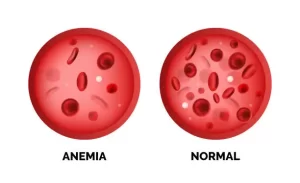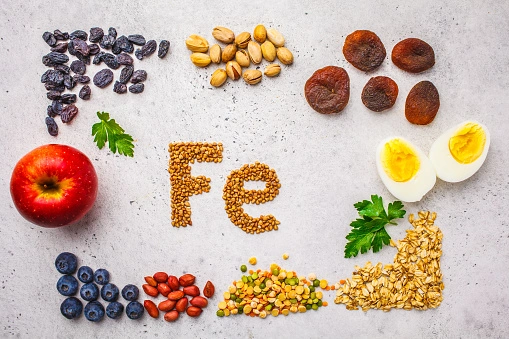Iron deficiency is a global health issue, affecting an estimated 1.6 billion people worldwide. Iron deficiency anemia occurs when the body doesn’t have enough iron to produce healthy red blood cells, leading to symptoms such as:
- Fatigue
- Weakness
- Shortness of breath
- Pale skin
- Cold hands and feet
- Frequent headaches
While iron deficiency supplements are often necessary, there are also natural remedies for anemia that can help manage and prevent this condition. This article will explore the causes of iron deficiency, the types of iron, and natural methods to improve your iron levels and maintain overall health.
Also Read- Understanding Common Monsoon-Related Illnesses in India: Causes, Symptoms, and Prevention
Understanding Iron Deficiency: Causes and Types
Iron is a crucial mineral that plays a key role in oxygen transport throughout the body. It’s an essential component of hemoglobin, the protein in red blood cells responsible for carrying oxygen from the lungs to tissues. When iron levels are low, the body can’t produce enough red blood cells, leading to iron deficiency anemia.
Common Causes of Iron Deficiency:
- Dietary Iron Deficiency: Insufficient intake of iron-rich foods or poor absorption of dietary iron is the leading cause.
- Blood Loss: Heavy menstrual bleeding, frequent blood donations, or internal bleeding due to ulcers or other conditions can deplete iron stores.
- Increased Iron Needs: Pregnancy, breastfeeding, and rapid growth spurts in children elevate iron requirements, potentially leading to deficiency if not met with adequate dietary intake.
- Medical Conditions: Diseases like celiac disease, Crohn’s disease, and ulcerative colitis can interfere with iron absorption.
Types of Iron:

- Heme Iron: Found in animal products such as red meat, poultry, and fish, heme iron is easily absorbed by the body.
- Non-heme Iron: Present in plant-based foods like beans, lentils, and leafy green vegetables, non-heme iron is less efficiently absorbed, but its absorption can be enhanced with the right dietary practices.
Natural Remedies to Boost Your Iron Levels
Addressing iron deficiency often requires a multifaceted approach. Below are natural remedies and lifestyle changes to help increase iron absorption and manage anemia effectively.
1.Dietary Modifications
-
Incorporate Iron-Rich Foods:
Heme Iron Sources: Include lean red meat, poultry, and fish in your diet to ensure a readily absorbed source of iron.
Non-heme Iron Sources: Add plant-based sources like beans, lentils, tofu, fortified cereals, and dark leafy greens (spinach, kale) to your meals.
-
Enhance Iron Absorption:
Pair iron-rich foods with vitamin C-rich foods (e.g., oranges, bell peppers, tomatoes) to boost the absorption of non-heme iron.
Limit intake of inhibitors such as coffee, tea, and calcium-rich foods around meals, as these can hinder iron absorption.
-
Iron-Fortified Foods:
Look for iron-fortified cereals, bread, and pasta to help meet your daily iron requirements more easily.
2.Ayurvedic and Herbal Supplements
-
Ayurvedic Supplements for Iron Deficiency:
Moringa: Rich in iron, moringa is an Ayurvedic supplement known for its ability to increase hemoglobin levels.
Ashwagandha: This adaptogenic herb supports overall health and can improve iron levels by reducing inflammation and enhancing absorption.
-
Herbal Remedies for Iron Deficiency:
Nettle Leaf: Nettle leaf tea is a traditional remedy for iron deficiency anemia, known for its high iron content.
Dandelion Root: This herb may stimulate red blood cell production, supporting overall blood health.
Yellow Dock: Traditionally used for its blood-building properties, yellow dock may help combat anemia naturally.
3. Low Iron Supplements
For individuals with persistent iron deficiency, supplements may be necessary. While there are many iron deficiency supplements available, it’s essential to choose those that align with your health needs:
Ferrous sulfate is often prescribed but can lead to gastrointestinal issues.
Iron bis-glycinate is a gentler option that is easier on the stomach.
Ayurvedic iron supplements like Lohasava are natural alternatives for those seeking herbal support.
Always consult your healthcare provider before starting any iron supplement regimen, especially if you are pregnant, breastfeeding, or have underlying health conditions.
4.Lifestyle Adjustments
-
Adequate Sleep:
Sleep plays a vital role in iron metabolism. Aim for 7-8 hours of quality sleep each night to support your body’s iron needs.
-
Regular Exercise:
Moderate-intensity exercise can enhance iron absorption and overall well-being. Consider activities like walking, cycling, or yoga to maintain healthy iron levels.
-
Stress Management:
Chronic stress can negatively impact iron absorption. Include stress management practices like meditation, deep breathing exercises, or yoga in your daily routine.
-
Monitor Your Progress:
Regular blood tests are crucial for tracking iron levels and the effectiveness of your dietary and lifestyle changes.
Additional Tips for Managing Iron Deficiency
- Read Food Labels: Look for high-iron foods when grocery shopping. Fortified products are often labeled with their iron content.
- Variety is Key: A balanced diet incorporating both heme and non-heme iron sources is crucial for meeting your iron needs.
- Seek Professional Guidance: If you suspect iron deficiency, consult a healthcare provider for a proper diagnosis and treatment plan.
Important Considerations
Iron Overload Risk: While addressing iron deficiency is essential, excessive iron intake can be harmful. Excessive iron intake can result in conditions such as hemochromatosis, which may harm organs. It’s important to consult your healthcare provider before starting any iron supplements.
Individual Needs: The effectiveness of natural remedies for anemia varies depending on the cause and severity of the deficiency. Personalized medical advice is crucial to finding the right balance.
- ALSO READ-
- UTI Home Remedies for Treating Urinary Tract Infection
- Home Remedies for Tonsillitis: 9 Easy Ways to Soothe Your Throat
- Home Acidity Remedies: Natural Solutions for Digestive Health
Conclusion
Iron deficiency is a widespread health concern, but it is manageable with the right approach. Incorporating natural remedies for anemia, along with iron-rich foods and proper supplements, can significantly improve your iron levels and overall health. By making these adjustments, you can combat iron deficiency and enhance your well-being. Always remember that a balanced diet, combined with healthy lifestyle habits, is the key to overcoming iron deficiency and maintaining optimal health.
FAQ’S
What happens when your iron is low?
Low iron levels can lead to iron deficiency anemia, which means your body doesn’t have enough red blood cells to transport oxygen efficiently. Symptoms may include fatigue, weakness, pale skin, shortness of breath, dizziness, and headaches. Prolonged deficiency can affect cognitive function and immune response. Iron is crucial for producing hemoglobin, which carries oxygen in the blood, so its deficiency impairs this essential function. If you suspect low iron, it’s important to consult a healthcare provider for diagnosis and treatment.
Which drink is high in iron?
Drinks rich in iron include fortified fruit juices, particularly those enhanced with iron such as some orange or apple juices. Beetroot juice is also high in iron. Iron-fortified plant-based milks like soy or almond milk can offer additional iron. While these beverages can help increase iron intake, pairing them with vitamin C-rich foods or drinks, such as citrus juices, enhances iron absorption. It’s best to consult a healthcare provider for personalized recommendations if you need to increase your iron levels.
Which food has the most iron?
Foods high in iron include red meat, such as beef and lamb, which are excellent sources of heme iron, the type most easily absorbed by the body. Other rich sources are liver and other organ meats. Plant-based options include lentils, spinach, and fortified cereals. Shellfish, particularly oysters and clams, are also very high in iron. To maximize iron absorption from plant-based sources, consume them with vitamin C-rich foods like bell peppers or citrus fruits.
What is a normal iron level?
Normal iron levels can vary by age, sex, and health status. Generally, for adults, normal serum iron levels range from 60 to 170 micrograms per deciliter (mcg/dL). For women, the range is typically 50 to 170 mcg/dL, while for men, it’s 60 to 180 mcg/dL. These values can differ based on individual health conditions and laboratory standards. It’s important to interpret iron levels with a healthcare provider, who can also assess related markers like ferritin and hemoglobin for a comprehensive evaluation.
How can I check if I have low iron?
To check for low iron, a healthcare provider will perform blood tests. Common tests include a complete blood count (CBC) to check for anemia, serum ferritin to assess iron stores, and serum iron and total iron-binding capacity (TIBC) to evaluate iron transport and availability. Symptoms of low iron, such as fatigue or dizziness, can prompt testing. If you suspect low iron, consult a healthcare provider who will recommend the appropriate tests and interpret results to determine if supplementation or dietary changes are needed.










[…] also known as vitamin B3, has become a skincare superstar. Lauded for its ability to minimize pores, brighten […]
[…] Also Read: Here Are Some Natural Remedies To Reduce Iron Deficiency […]